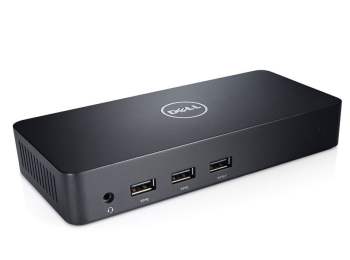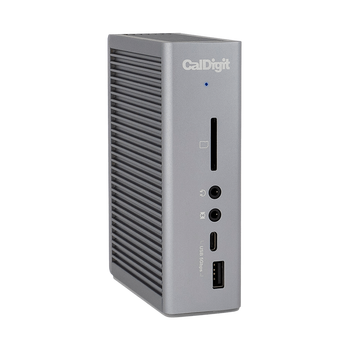- Supports multiple displays
- Small footprint
- Good range of ports
- Affordable price
- Extensive port selection
- Supports high-resolution displays
- High-speed connections
- Robust build quality
- Limited to one 4K display
- Plastic construction
- Premium price
- Requires Thunderbolt 3 compatibility
Dell D3100 vs CalDigit TS3 Plus
When it comes to laptop docking stations, two popular options stand out from the rest: the Dell D3100 and the CalDigit TS3 Plus. Both of these devices are designed to provide a seamless and convenient way to connect your laptop to multiple peripherals, expanding its capabilities and enhancing productivity. In this comparison, we'll delve into the features, performance, and design of each docking station to help you decide which one best suits your needs.
Design and Build
The Dell D3100 is a compact and lightweight docking station that measures 5.4 inches wide, 3.7 inches deep, and 1.2 inches tall. It has a sturdy plastic construction with a sleek, modern design that fits well on any desk or workspace. The device features a simple and intuitive layout, with all ports and connectors easily accessible.
On the other hand, the CalDigit TS3 Plus is slightly larger, measuring 6.2 inches wide, 4.5 inches deep, and 1.5 inches tall. It has a robust aluminum construction that exudes premium quality and durability. The design is more angular and futuristic, with a focus on functionality and ease of use.
Connectivity Options
Both laptop docking stations offer an impressive array of connectivity options, but there are some key differences. The Dell D3100 features:
- 3 x USB 3.0 ports
- 1 x USB 2.0 port
- 1 x DisplayPort
- 1 x VGA port
- 1 x Ethernet port
- 1 x Audio out
In contrast, the CalDigit TS3 Plus boasts:
- 5 x USB 3.1 Gen 1 ports (including 1 x USB-C)
- 2 x Thunderbolt 3 ports
- 1 x DisplayPort
- 1 x HDMI port
- 1 x Gigabit Ethernet port
- 1 x Audio in/out
The CalDigit TS3 Plus clearly offers more advanced and versatile connectivity options, including Thunderbolt 3 and USB-C, which provide faster data transfer speeds and greater compatibility with modern devices.
Performance
In terms of performance, both docking stations deliver reliable and stable connections. However, the CalDigit TS3 Plus has a slight edge when it comes to charging capabilities, supporting up to 85W Power Delivery (PD) over Thunderbolt 3 or USB-C. This means you can charge your laptop at faster speeds, which is especially useful for larger devices.
The Dell D3100, on the other hand, supports up to 65W PD over its USB-C port. While this is still sufficient for most laptops, it may not be enough for more power-hungry devices.
Compatibility
Both docking stations are compatible with a wide range of laptops and operating systems, including Windows, macOS, and Chrome OS. However, the CalDigit TS3 Plus has better support for macOS, with seamless integration with MacBooks and iMacs.
Conclusion
In conclusion, both the Dell D3100 and the CalDigit TS3 Plus are excellent laptop docking stations that offer a convenient way to expand your laptop's capabilities. While the Dell D3100 is a more affordable option with a compact design, the CalDigit TS3 Plus offers more advanced connectivity options, faster charging, and better compatibility with modern devices.
If you're looking for a budget-friendly solution with basic connectivity needs, the Dell D3100 may be the better choice. However, if you require more advanced features, faster data transfer speeds, and greater versatility, the CalDigit TS3 Plus is the superior option. Ultimately, the decision comes down to your specific needs and preferences when it comes to laptop docking stations.































